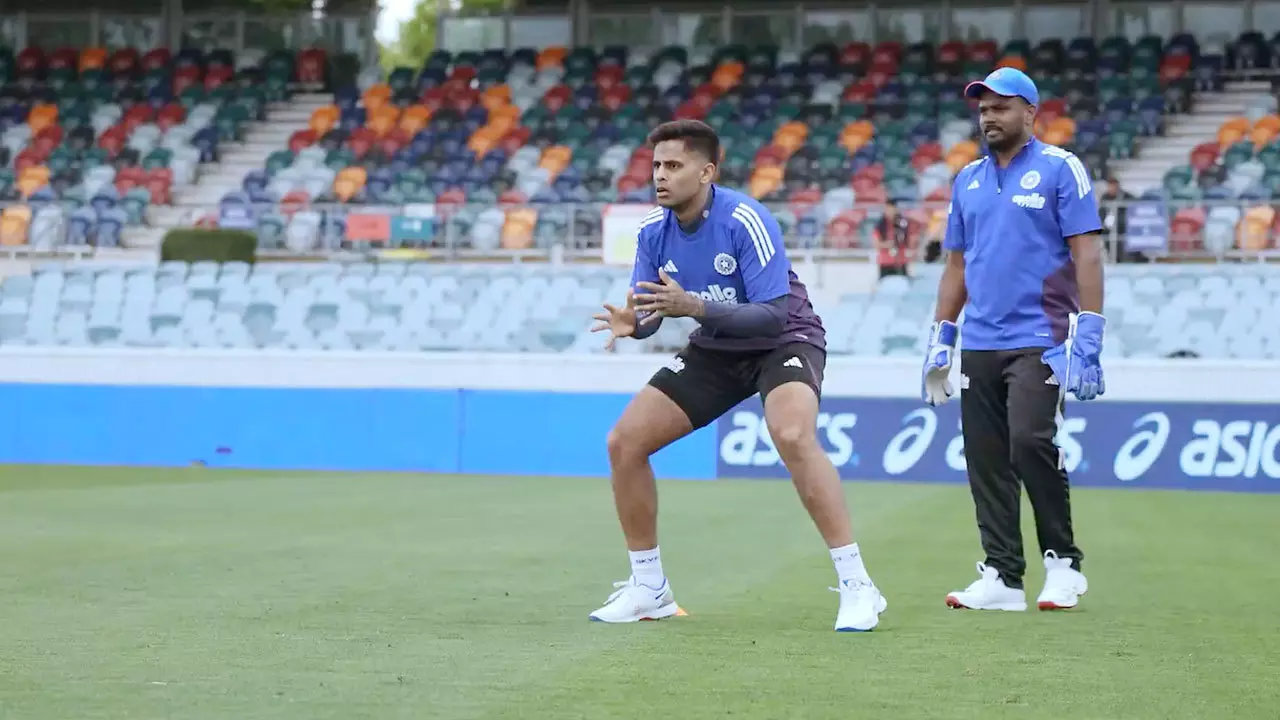India’s T20I captain Suryakumar Yadav has set a clear tone ahead of the five-match T20I series against Australia, describing the tour as a vital step in India’s preparation for the 2026 ICC T20 World Cup. Rather than viewing the series as an isolated overseas challenge, Suryakumar emphasized that the team is treating it as part of a continuous process — a long-term project that began months ago and will carry forward seamlessly into next year’s global tournament.
A Step Toward the 2026 World Cup: “Our Preparation Has Already Begun”
Speaking at a pre-series press conference, Suryakumar revealed that India’s road to the 2026 T20 World Cup began with the Asia Cup earlier this year, and that the team has been steadily building its identity and structure ever since.
“Our preparation for the 2026 T20 World Cup obviously started with the Asia Cup,” Suryakumar said. “Since then, we’ve been playing T20s regularly and fine-tuning our combinations. The goal is to keep the process going without worrying too much about where we’re playing or who the opposition is.”
He stressed that the focus remains on consistency and clarity, not on the venue or format of each series. “We are not looking at this as an overseas series in a foreign country. It’s an extension of what we’ve been doing for the last few months — a build-up to the World Cup.”
India’s approach under Suryakumar appears to be an evolution of the aggressive and fearless brand of T20 cricket the team has aimed for in recent years. The ongoing five-match series against Australia, starting October 29 in Canberra, provides the ideal testing ground for India’s plans.
A Packed Schedule: Five-Match Series Across Australia
India’s tour itinerary features games in Canberra (October 29), Melbourne (October 31), Hobart (November 2), Gold Coast (November 6), and Brisbane (November 8). Each venue presents unique challenges — from the lively bounce of the Melbourne Cricket Ground to the windy conditions in Hobart and the humid atmosphere in Queensland.
Despite the variety, Suryakumar downplayed the notion of “alien conditions.”
“There isn’t much difference in our combination,” he said. “Last time, when we went to South Africa, we played with one fast bowler, one all-rounder, and three spinners. The conditions here are also similar — slightly bouncy tracks, but not unplayable. So, we don’t need to overhaul our plan.”
The captain’s focus is on building cohesion rather than experimenting excessively. “We have a set template. Everyone knows their role. Whether it’s batting first or chasing, whether the wicket is flat or has bounce — we’ll stick to our process.”
A Balanced Squad and Defined Roles
Suryakumar, known for his improvisational batting and fearless leadership, is steering a young but dynamic team filled with proven performers and emerging stars. With Hardik Pandya, Ruturaj Gaikwad, Ravi Bishnoi, and Arshdeep Singh forming the core, the team combines explosiveness with tactical flexibility.
The captain explained that each player has a clearly defined role in India’s T20 setup. “Every individual knows what is expected from him. We have clarity — who bats in the powerplay, who finishes, who bowls the key overs. That clarity makes a big difference at the international level,” he said.
India’s current T20 unit is also expected to rotate between series, allowing new faces to gain exposure while senior players like Jasprit Bumrah and Ravindra Jadeja manage their workloads. According to team insiders, the BCCI is keen to maintain a large, competitive pool of players leading into 2026, especially after the lessons from past World Cups.
Suryakumar’s Leadership: Calm, Calculated, and Creative
Since taking over as India’s T20I captain, Suryakumar Yadav has showcased a calm yet attacking leadership style. His field placements often reflect his instinctive understanding of the game — aggressive but smart, much like his batting.
Under his leadership, India has begun to experiment with match-ups, flexible batting orders, and data-driven decision-making. His on-field demeanor — composed and positive — has drawn comparisons to MS Dhoni’s captaincy calm and Rohit Sharma’s strategic sharpness.
However, Suryakumar insists that leadership, for him, is about empowering players rather than controlling them. “Everyone in this team is encouraged to take responsibility. We have an environment where players are free to express themselves. That’s the key to modern T20 cricket — freedom and trust,” he said.
Focus on Process Over Outcome
India’s previous T20 World Cup campaigns have been marked by flashes of brilliance but also inconsistency in high-pressure situations. Learning from those experiences, Suryakumar has prioritized process-driven cricket.
“The idea is simple — if we follow our process consistently, results will take care of themselves,” he explained. “You can’t control outcomes in cricket, but you can control preparation, mindset, and intent.”
His statement reflects a growing maturity within Indian cricket — a shift from result obsession to performance sustainability. The emphasis now is on creating systems that outlast tournaments, ensuring India remains competitive across formats.
Australia: The Familiar Challenge
Australia, India’s opponent in the five-match series, remains one of the toughest teams in world cricket. Despite recent transitions, the Aussies boast a balanced T20 squad, blending youth and experience. For Suryakumar, the challenge lies not in the opponent but in maintaining India’s rhythm.
“Playing Australia anywhere is tough, but also exciting. It’s a beautiful country to play cricket — challenging but rewarding,” he said. “They play hard cricket, and that brings the best out of us.”
India’s record in T20Is against Australia has been impressive in recent years, but Suryakumar is not taking anything for granted. “Every match is a new opportunity. We’ll focus on our game, our strengths, and make sure we play fearless cricket.”
Update on Shreyas Iyer: “He’s Stable and Responding”
Beyond cricketing discussions, Suryakumar also shared an emotional update about teammate Shreyas Iyer, who recently sustained a spleen laceration while attempting a catch during the third ODI against Australia at the Sydney Cricket Ground. Iyer was immediately taken to a local hospital and later admitted to the Intensive Care Unit (ICU).
Addressing reporters, Suryakumar reassured fans about Iyer’s condition. “We spoke to him. On the first day, I called him, but he didn’t have his phone. Then I spoke to our physio, Kamlesh, who confirmed that Shreyas was stable. Over the last two days, he’s been replying to our messages, which is a great sign.”
He added that Iyer remains under medical supervision but is recovering steadily. “If he’s replying on the phone, that means he’s stable. The doctors are monitoring him closely, and things look positive. We’re all praying for his quick recovery.”
The injury has ruled Iyer out of the ongoing T20 series, but team sources suggest he could return to light training before the end of the year, depending on his recovery progress.
Building for the Future: India’s Long-Term Vision
Suryakumar’s words reflect a larger transformation in India’s approach to white-ball cricket — a move toward continuity, adaptability, and youth-driven innovation. The BCCI and team management, under head coach Rahul Dravid, have designed a roadmap that extends beyond just one tournament.
India’s T20 structure now focuses on rotation, fitness monitoring, and multi-role players. By 2026, the management expects to have a flexible core that can adapt to any condition. The coaching staff has also been using domestic performances and India A tours to identify new prospects for the international stage.
As Suryakumar explained, “The plan is not just to prepare for the next World Cup, but to build a team that can sustain for years. We’re trying to give youngsters enough exposure, so when they step up, they are ready.”
This sentiment echoes the philosophy that powered India’s dominance in the early 2010s — continuity and depth across formats.
Lessons from Past Campaigns
Since India’s title-winning campaign in the 2007 ICC T20 World Cup, the team has reached the semifinals or finals multiple times but has struggled to cross the final hurdle. In 2024, India exited the tournament after a narrow semifinal loss — a defeat that prompted introspection about strategy and adaptability.
Under Suryakumar’s leadership, those lessons are being translated into tangible change. “Every setback teaches you something,” he said. “We learned that flexibility and adaptability are key in T20 cricket. You can’t rely on one formula or one player. Everyone has to be ready to contribute.”
He added that the current squad is being trained to handle pressure better. “We’re working on game awareness — how to stay calm under pressure, how to adapt to different situations. That’s what separates good teams from great ones.”
The Road Ahead: Blending Experience with Youth
India’s preparation for the 2026 T20 World Cup will continue through a packed calendar of bilateral series, domestic tournaments, and franchise cricket. Players like Yashasvi Jaiswal, Tilak Varma, and Rinku Singh are expected to play key roles alongside established names.
The challenge for Suryakumar and his team will be maintaining balance — giving new players opportunities while keeping the core stable. “Rotation is important, but so is continuity,” he said. “We’ll manage workloads carefully. The idea is to have everyone fresh, fit, and in form when the World Cup begins.”











